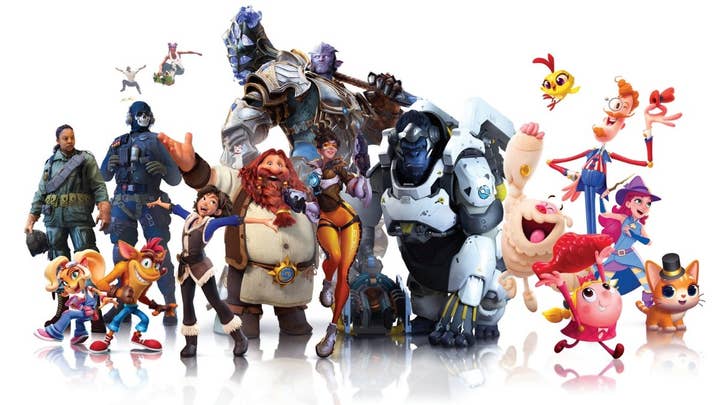The new Ubisoft+ and getting gamers comfortable with not owning their games
Ubisoft introduces its Classic service to PC; and 'more to come' on Activision Blizzard
Ubisoft has rebranded its subscription offering and introduced a new service for PC players.
Ubisoft's main all-singing, all-dancing subscription offering has been rebranded Ubisoft+ Premium. This service is the one that features all new releases such as this week's Prince of Persia: The Lost Crown (which is available early to subscribers). It costs $17.99 and is accessible via PC, Xbox and Amazon Luna.
In addition, the firm is adding Ubisoft+ Classics on PC. The Classics option was already available to PlayStation players (via Sony's own subs offering) and features back catalogue games like Far Cry 6 and Rainbow Six: Siege for $7.99 a month.
"We looked at the consumer behaviour and how people were interacting with our offer and we saw an opportunity for us to evolve," explains Philippe Tremblay, director of subscriptions at Ubisoft.
"When we look at how gamers engage with our different games, we see that our back catalogue is still very active and alive. So we saw an opportunity to offer these worlds to our consumers for a lower fee. And this is a response to the behaviour that we saw from players."
Tremblay says that the company has seen 'millions' of subscribers over the last four years, who have collectively played over half a billion hours of gameplay. Some sign-up to trial one game for a month or two, while others come in, stick around and play numerous titles.
"There are multiple behaviours," he explains. "There are definitely a lot of people who come in for one game and then decide to buy it after [the subscription ends]. That's part of the reality and that's ok with us."
Ubisoft+ Premium's price point exceeds, in some cases, what Xbox and PlayStation charge for their services. Some of this will be to do with the business realities behind putting brand new AAA games into a subscription service, but Tremblay believes the cost is reasonable considering what's on offer.
"We're talking day one releases, and with games like Prince of Persia, you get early access. We already have Avatar, Assassin's Creed: Mirage… all of these games are available to play. That's tremendous value already. And then there's the catalogue, too. Thousands of dollars of games.
"And you don't just get access to these games, you get the premium editions. So it's all the added content that comes with that. We have rewards, too. And one of the big advantages with Ubisoft+ is that you get to play these across multiple devices. From one subscription, you can access our titles through PC, Xbox and Amazon Luna."
.png?width=720&quality=70&format=jpg&auto=webp)
There's a lot of debate around subscription in video games. Today, the business model is the dominant way of paying for TV, film and music, but that's not currently the case in this industry. Games are typically much longer, many of them are free or feature some other form of monetisation, and AAA publishers have argued that the numbers just don't add up.
Nevertheless, Ubisoft is seeing growth in this sector. Tremblay says that October last year was the biggest month in Ubisoft+ history.
"The point is not to force users to go down one route or another," he explains. "We offer purchase, we offer subscription, and it's the gamer's preference that is important here. We are seeing some people who buy choosing to subscribe now, but it all works."
He says that subscription has enabled Ubisoft to bring in new players, with one in ten Ubisoft+ subscribers having never engaged with the company's games before.
"It is proving to be a way for gamers to access our worlds who perhaps weren't inclined to purchase," he tells us.
"These players are brand new. We're shaking hands for the first time. It's been Ubisoft's strategy for as long as I've been here to try and reach more players with the franchises that we have. So I'm happy, as the leader of this product, to be able to deliver on that."
"Gamers are used to owning their games. That's the consumer shift that needs to happen"
The question remains around the potential of the subscription model in games. Tremblay says that there is "tremendous opportunity for growth", but what is it going to take for subscription to step up and become a more significant proportion of the industry?
"I don't have a crystal ball, but when you look at the different subscription services that are out there, we've had a rapid expansion over the last couple of years, but it's still relatively small compared to the other models," he begins. "We're seeing expansion on console as the likes of PlayStation and Xbox bring new people in. On PC, from a Ubisoft standpoint, it's already been great, but we are looking to reach out more on PC, so we see opportunity there.
"One of the things we saw is that gamers are used to, a little bit like DVD, having and owning their games. That's the consumer shift that needs to happen. They got comfortable not owning their CD collection or DVD collection. That's a transformation that's been a bit slower to happen [in games]. As gamers grow comfortable in that aspect… you don't lose your progress. If you resume your game at another time, your progress file is still there. That's not been deleted. You don't lose what you've built in the game or your engagement with the game. So it's about feeling comfortable with not owning your game.
"I still have two boxes of DVDs. I definitely understand the gamers perspective with that. But as people embrace that model, they will see that these games will exist, the service will continue, and you'll be able to access them when you feel like. That's reassuring.
"Streaming is also a thing that works really well with subscription. So you pay when you need it, as opposed to paying all the time."
Streaming is a distribution method that appears to lend itself to the subscription model, although currently it remains a very niche corner of the business. Ubisoft CEO Yves Guillemot told GI in June that Ubisoft believes in streaming, but that it needs time. "It's getting there," he told us. "Just not as fast as we thought. When you are in a good city with good internet, it's fantastic. But it's not the case for everyone. The Nvidia experience, for example, is fantastic, but we thought it would go faster. We've learned a lot by working with these services, and we're using that experience to enhance what we're doing,"

Ubisoft's commitment towards streaming was evident when it acquired the streaming rights to Activision Blizzard's games in August. The firm plans to add these games into Ubisoft+ in the future, although Tremblay had little to say on the subject today.
"We are actively working on this part," he says. "There's more to come. Our players are definitely excited about this."
He adds: "For me, whenever we publish a game, the first thing I do is stream it and play a couple of minutes. I don't have to download it, I can jump right in. Streaming enables fast discovery. That's the first thing we are seeing from a consumer perspective."
There are those in the industry that feel streaming and subscription hold the keys to unlocking new players, and will become significant ways for gamers to access and pay for their games in the future. Yet already there's talk of subscription fatigue across all media, and that's something that Tremblay acknowledges is a challenge.
"[Subscription fatigue] is part of the consumer reality," he concludes. "And I'm a dad with teenagers… it's difficult to keep up with what you're subscribing to and where. That's part of the challenge we have as a subscription service, and we're embracing that.
"Despite this, we see that in terms of consumer behaviour there is a lot of growth for us. But also… the subscription business is a monthly business for us. We're asking for a low commitment from gamers. We welcome them whether they want to stay a month or multiple months."

